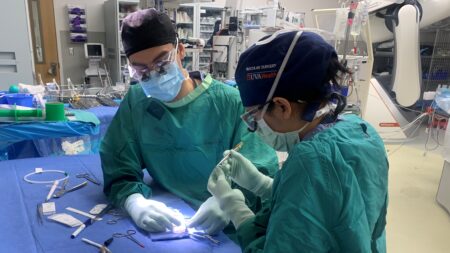Curriculum
 The primary focus of the Vascular Surgery Fellowship program is on operative and endovascular experience, with appropriately graduated autonomy for fellows as they gain experience and skills in the pre-operative, peri-operative, and post-operative care and management of vascular surgical patients. The clinical training follows a modified apprenticeship model, with each vascular trainee assigned to an attending surgeon team to facilitate close one-on-one interaction, continuity of patient care from clinic to surgical planning and through the postoperative period, and the development of strong mentorship relationships.
The primary focus of the Vascular Surgery Fellowship program is on operative and endovascular experience, with appropriately graduated autonomy for fellows as they gain experience and skills in the pre-operative, peri-operative, and post-operative care and management of vascular surgical patients. The clinical training follows a modified apprenticeship model, with each vascular trainee assigned to an attending surgeon team to facilitate close one-on-one interaction, continuity of patient care from clinic to surgical planning and through the postoperative period, and the development of strong mentorship relationships.
The program features weekly didactic and case review conferences, as well as monthly research, quality improvement, and morbidity and mortality meetings. Through participation in weekly interdisciplinary clinical conference, residents are exposed to a wide variety of ideas and perspectives regarding the treatment of vascular disease. The residents will present topics for discussion at clinical case conference, multidisciplinary conferences and at local and national vascular surgery meetings. Each vascular surgery fellow will attend at least one national scientific conference and one regional conference or educational course annually, and travel and expenses are supported for any additional domestic conferences where a resident’s work is accepted for presentation. It is the goal of the Vascular Surgery faculty to teach by example, and with daily contact, demonstrate at all times the highest level of integrity, professionalism, dedication to service and compassion toward those entrusted in their care.
Residents are also supported in their training in the interpretation and performance of noninvasive vascular lab studies, in anticipation of sitting for the RPVI exam.
Educational Program in the Vascular Laboratory
Goal
Provide education and basic hands-on skills necessary to correctly interpret physiologic and vascular ultrasound studies.
Overview
The fellows participate in a 2 hour course entitled Introduction to Vascular Ultrasound. The Neurology/Vascular Medicine fellows will spend a month in the vascular laboratory at the beginning of their fellowship. The Vascular Surgical and Interventional Radiology fellows will spend a month in the vascular laboratory during their second year fellowship. During their time in the vascular laboratory, the fellows will be assigned to an attending physician to teach them how to interpret the vascular studies. All fellows will be required to do a presentation at one of the weekly vascular conferences, or to his/her supervising attending physician about a vascular study during their fellowship at UVA.
- Demonstrate the ability to gather essential patient information prior to performing a vascular ultrasound study.
- Make informed decisions about the limitation and accuracy of noninvasive ultrasound and physiologic vascular studies.
- Acquire skills for selected noninvasive ultrasound and physiologic vascular studies.
- Knowledge of basic ultrasound physics
- Interpretation of extremity arterial and venous physiologic studies
- Interpretation of carotid, renal, venous, visceral and extremity duplex
- Understanding the indication, accuracy and diagnostic utility of specific noninvasive vascular test
- Learn how to properly read and sign off in EPIC/CUPID
- Assist in quality assurance and correlation of vascular studies with other modalities
- Instruction by the medical and technical directors enables the fellow to perform and interpret vascular noninvasive ultrasound and physiologic studies
- Acquire basic skills and knowledge to sit for the RVPI board exam
- Participate in teaching medical students and general surgery residents information pertaining to noninvasive vascular studies
- Understand systems of delivery of health care and their financing, including vascular ultrasound and procedural coding
Application Info
We participate in the vascular surgical match coordinated through the NRMP. We alternate between one and two positions annually and accept applications via the ERAS system.
